Half of Americans Will Celebrate Easter in Church
Easter may not be the top holiday for Americans, but half will still honor the holiday in church. (To see survey question wording, click here.)

Easter may not be the top holiday for Americans, but half will still honor the holiday in church. (To see survey question wording, click here.)

Voters’ views of the Internal Revenue Service may be improving, but a plurality are still dubious of the tax-collecting agency’s ability to fairly enforce tax laws.

"Eli, Eli, lama sabachthani? (My God, my God, why have you forsaken me?)" Those are among Jesus' last words on the Cross that first Good Friday.

Even after the shooting and death of an eight-year-old student and a teacher at a school in San Bernardino, California, earlier this week, most Americans still think schools are safe places for children.

President Trump says U.S. relations with Russia are at “an all-time low,” but voters think the United States can still work with Russia on some issues.

Whatever happens in the first round of voting in the special election in Georgia’s Sixth Congressional District on Tuesday, it seems like a safe bet that the result will get a fair amount of national attention because of what it may tell us about the 2018 midterm. But before getting into what those lessons may be, let’s remember that this is a special election — and thus it features special circumstances.

Attorney General Jeff Sessions has ordered a review of the reform agreements President Obama's Justice Department required of several urban police departments following high-profile police shootings.

Senate Republicans recently voted to eliminate proposed privacy rules that prevent Internet Service Providers (ISPs) from selling or sharing users’ browsing history and other personal information, and voters aren’t having it.

Springtime may be in bloom, but snowflakes never go out of season at America's most prestigious colleges and universities.

Voters appear to be less concerned that tense United States-Russia relations will have a negative impact on America, but they still strongly believe the two nations are headed for another Cold War scenario.

Remind me again: Who is the impulsive, trigger-happy pugnacious brute who cannot be trusted with the nuclear codes?

Somehow, firing Tomahawk missiles at Syria suddenly changed people's opinions of President Trump. Now they call him a "serious" leader.

Democratic National Committee Chairman Tom Perez recently said he doesn't accept that Donald Trump is president. Most Democrats agree.

Most voters support President Trump’s missile strike on Syria but feel further action against the Syrian government should come from the United Nations and not the United States alone.

"Drain the swamp." It was one of President Trump's most powerful messages on the way to victory. Shake up Washington, D.C. Break a few eggs to create a new omelet. Overturn the establishment.

Virgin Galactic owner Richard Branson insists he'll have commercial travelers in space by the end of next year, but a trip to space isn’t high on most Americans’ to-do lists.

By firing off five dozen Tomahawk missiles at a military airfield, our "America First" president may have plunged us into another Middle East war that his countrymen do not want to fight.

Thirty-six percent (36%) of Likely U.S. Voters think the country is heading in the right direction, according to a new Rasmussen Reports national telephone and online survey for the week ending April 6.

Voters are split on whether President Barack Obama or his inner circle were aware that U.S. intelligence agencies were spying on Donald Trump’s campaign, but they don’t believe Obama officials leaked names picked up in the surveillance efforts to the media.

One of the greatest decisions of the 20th Century was the unflinching order by President Harry S. Truman to drop two bombs on Japan.